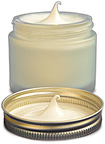 If sunscreen doesn't work, why isn't anyone talking more about it? This is where we come back to Hans Christian Andersen's story about the emperor who paraded around town naked.
If sunscreen doesn't work, why isn't anyone talking more about it? This is where we come back to Hans Christian Andersen's story about the emperor who paraded around town naked.
Perhaps everyone is afraid to say anything for fear of looking stupid. Sunscreen probably doesn't work to prevent skin cancer. There's no question that it stops sunburn, though.
One thing's for certain: Sunscreen is definitely no miracle cure to prevent skin cancer. You've got to do something else. The best way to prevent sun damage is to keep skin covered when exposed to bright sunlight, and to protect the skin with antioxidant vitamins and polyphenol plant extracts.
Antioxidant Protection - A Better Way?
Sun damage is oxidative damage, and there are clear studies that show vitamins and plant extracts can reduce oxidative damage due to UV radiation, providing protection against skin cancer. Radiation damage increases the generation of reactive oxygen species in the skin cells. Various phenolic compounds and flavonoids that we are already familiar with will quench these oxidative species and can be used to provide protection.
 The best way to get these compounds to the cells that need them the most is by topical application. A 2004 article in the Journal of Cosmetic Dermatology tells us: "There are two great advantages in applying an active formulation of topical antioxidants to the skin. First, the skin attains far higher levels of each antioxidant than can be achieved by only taking these vitamins orally. The level of vitamin C attained in the skin by topical application is 20-40 times that achievable with oral vitamin C. With topical application, the concentration of vitamin E in the skin increases by a factor of 10.6 and selenium by a factor of 1.7. Second, topical application arms the skin with a reservoir of antioxidants that cannot be washed or rubbed off, a protection which stays in the skin for several days after application."
The best way to get these compounds to the cells that need them the most is by topical application. A 2004 article in the Journal of Cosmetic Dermatology tells us: "There are two great advantages in applying an active formulation of topical antioxidants to the skin. First, the skin attains far higher levels of each antioxidant than can be achieved by only taking these vitamins orally. The level of vitamin C attained in the skin by topical application is 20-40 times that achievable with oral vitamin C. With topical application, the concentration of vitamin E in the skin increases by a factor of 10.6 and selenium by a factor of 1.7. Second, topical application arms the skin with a reservoir of antioxidants that cannot be washed or rubbed off, a protection which stays in the skin for several days after application."
A variety of compounds have already been studied that work. Vitamin C, vitamin E and selenium help heal sun damage to cells. Vitamin E is very protective, especially in combination with selenium. Green tea extracts also prevent damage. Actually, quite a few plant extracts appear to be protective. If you are making a list, add milk thistle, grape seed extracts, pomegranate extracts, caffeine and cat's claw.
Unfortunately, no one seems to be making a product containing actual therapeutic doses of these supplements. No problem; it is actually easy to make your own. Pick a moisturizer or whatever topical cream you like to use, open up a few capsules of any of these vitamins and plant extracts, and mix them in. About 2 to 10 grams added to each ounce of cream should do it. You've created your own topical antioxidant sun protectorant. Apply this fortified skin cream to sun-exposed skin daily, especially before and after intense sun exposure. It won't prevent sunburn, but it may eventually be proven to prevent skin cancer.

